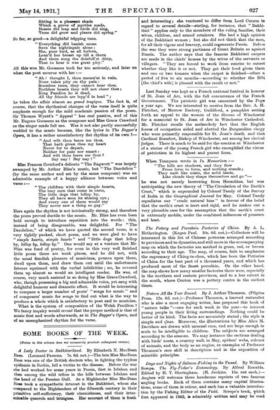SOME BOOKS OF THE WEEK.
[Notice in this column does not necessarily preclude subsequent review.]
A Lady Doctor in Bakhtiariland. By Elizabeth N. MacBean Ross. (Leonard Parsons. 7s. 6d. net.)—The late Miss MacBean Ross was one of the British doctors who, in fighting the typhus epidemic in Serbia, fell a victim to the disease. Before the war she had worked for some years in Persia, first in Isfahan and then among the wild tribes in the hills between Isfahan and the head of the Persian Gulf. As a Highlander Miss MacBean Roes took a sympathetic interest in the Bakhtiari, whom she compared to the Highlanders of the fifteenth century in their primitive self-sufficiency, their clannishness, and their inter- minable quarrels and intrigues. Her account of them is fresh
and interesting ; she ventured to differ from Lord Curzon in regard to several details—stating, for instance, that " Bakhi- tiari " applies only to the members of the ruling families, their wives, children, and armed retainers. She had a high opinion of the Bakhtiari women ; but she did not think that the mon, for all their vigour and bravery, could regenerate Persia. Before the war they were strong partisans of Great Britain as against Russia. The author says that the famous Bakhtiari carpets are made in the chiefs' houses by the wives of the servants or villagers. " They are forced to work from sunrise to sunset whether they like it or not. They get their food given them and one or two tomans when the carpet is finished—often a period of five to six months—according to whether the Bibi [the chief's wife] is pleased with the result or not."
Last Sunday was kept as a French national festival in honour of St. Joan of Aro, with the full concurrence of the French Government. The patriotic girl was canonized by the Pope a year ago. We are interested to receive from the Rev. A. H. Fletcher, of Morrow Rectory, Guildford, a pamphlet setting forth an appeal to the women of the diocese of Winchester for a memorial to St. Joan of Arc in Winchester CathedraL Mr. Fletcher recalls the melancholy fact that the English forces of occupation aided and abetted the Burgundian clergy who were primarily responsible for St. Joan's death, and that Cardinal Beaufort, Bishop of Winchester, sat among her clerical judges. There is much to be said for the erection at Winchester of a statue of the young French girl who exemplified the virtue of patriotism in its highest and purest form.


































 Previous page
Previous page